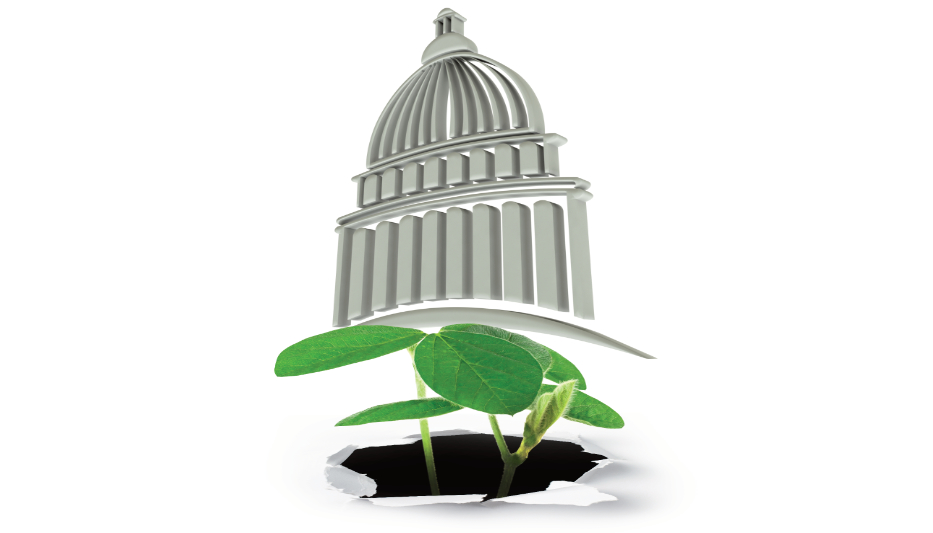All
Heating Fuel Industry Applauds Tax Credit Extension
by By Jim Collura, Vice President & Director of Government Affairs, NEFI and Samuel Diamond, Editor, Oil & Energy

In an important move that will help the heating oil industry achieve its goals of higher blends of renewable fuel and significant reductions in greenhouse gas (GHG) emissions, President Trump signed into law a year-end spending bill (H.R.1865) that includes a five-year extension of the federal biodiesel tax credit.
Heating oil associations and their members are applauding renewal of the biodiesel tax credit and expired tax provisions, known as “tax extenders.” The proposal enjoyed support from members of Congress in all nine Northeast states and strong bipartisan support from lawmakers across the country.
The new law renews the biodiesel tax credit retroactively for 2018 and 2019. To provide long-overdue certainty to the market and incentivize blending into the future, Congress is extending the credit for an additional three years, or through 2022. The tax credit will continue to offer $1 per gallon for the blending of qualified biodiesel and renewable diesel into distillate fuels including home heating oil. Blends of biodiesel and conventional heating oil are often referred to as Bioheat® fuel – a safe, efficient, and environmentally competitive home heating fuel.
The credit had been in limbo since its lapse at the end of 2017, leaving producers, wholesale and retail marketers, and consumers in the lurch. Over the last two years, heating oil associations joined forces with the biodiesel industry to press for reinstatement of the tax credit. Grassroots advocacy campaigns generated thousands of letters and phone calls to Congress and frequent “fly-in” events brought retail marketers to Washington to meet with key lawmakers.
NEFI President & CEO Sean Cota said, “I would like to personally thank everyone that wrote, called, or took the time to meet personally with members of Congress in support of this hard-fought effort.” Cota said the credit’s renewal will boost confidence in renewable liquid heating fuels and result in greater investments by the business community. “Policymakers are beginning to acknowledge that our industry can achieve dramatic greenhouse gas reductions in a shorter period of time, and with minimal cost to the homeowner, as compared to other heating fuels.”
“Restoration of the credit has been a top priority for businesses like mine as we pursue higher blends in our fuel and partner with policymakers in reducing carbon emissions and hence retain our customer base,” said NEFI Government Affairs Committee Chairman Scott E. MacFarlane of MacFarlane Energy in Dedham, Massachusetts. “Importantly, it will help further our industry’s commitments under the Providence Resolution,” he said.
MacFarlane is referring to a recent commitment by the heating oil industry to reduce GHG emissions and help meet increasingly aggressive state and regional climate change laws. At an industry summit in Providence, Rhode Island in September, more than 300 industry representatives endorsed the following resolution: “Be it resolved that the heating oil industry will reduce its greenhouse gas emissions - based on 1990 levels - by 15% by 2023, 40% by 2030 and net-zero by 2050.”
Heating oil retailers across the Northeast already offer biodiesel blends of 20% (B20) or higher. Rigorous studies have found that even modest blends result in dramatic GHG emissions reductions. A 50% (B50) blend in the Northeast would reduce carbon emissions by 18.5 million metric tons, which is like removing four million cars from the road. That is more than all the registered vehicles in New York City, Boston, and Philadelphia combined.
Northeast heating oil associations that supported the biodiesel industry on key policy issues last year include the Berks-Schuylkill Oil Heat Association, Better Home Heat Council of Lehigh Valley, Connecticut Energy Marketers Association, Delaware Valley Energy Marketers Association, Empire State Energy Association, Energy Marketers Association of New Hampshire, Energy Marketers Association of Rhode Island, Fuel Merchants Association of New Jersey, Maine Energy Marketers Association, Massachusetts Energy Marketers Association, NEFI, New York State Energy Coalition, Northeast Pennsylvania Energy Marketers Association, South Central Pennsylvania Energy Association, and the Vermont Fuel Dealers Association.
“A Big Win” for Biofuels
The biodiesel tax credit (BTC) was also strongly supported by the National Biodiesel Board (NBB), the trade association for U.S. biodiesel producers. In a statement, NBB said the credit would help to expand markets and support expansion of biodiesel and renewable diesel production.
Kurt Kovarik, NBB’s Vice President of Federal Affairs, stated, “Today’s announced deal provides the policy certainty that the biodiesel industry has been seeking to support investments and continued growth of production. NBB and its members are grateful that Congressional leaders are providing a positive signal before the year’s end.
“On behalf of NBB members, I’d like to thank Senator Chuck Grassley and Representative Abby Finkenauer as well as many other senators and representatives from both sides of the aisle for their strong and consistent championship of our industry. I’d also like to thank the producers, soybean farmers, heating oil distributors, blenders, and others who have worked tirelessly to advocate for extension of the biodiesel tax credit.”
Many NBB members had advocated strongly for the BTC, including Renewable Energy Group (REG), the largest biodiesel producer by volume in the U.S. In response to the credit’s retroactive reinstatement and extension, REG President & CEO CJ Warner issued the following statement.
“Friday’s news represents a big win for the environment, for agriculture, and for US motorists. For too long the biomass-based diesel industry has been held back from showing its real potential due to the recurring uncertainty around the BTC. Now, thanks to the work of biodiesel champion lawmakers, we can accelerate our strategy and further deliver at scale the enormous benefits of biodiesel and renewable diesel.
“We are grateful to so many who made this a reality for the biodiesel industry. Senator Chuck Grassley is a tireless biodiesel champion and his intrepid leadership helped build the industry from the beginning. Senator Maria Cantwell’s years of persistence on the industry’s behalf as a fighter for lower carbon fuels was crucial. Senator Joni Ernst played a key role in securing President Trump’s support for the BTC and we sincerely thank all of these pivotal leaders. Thank you to all of the biodiesel advocates in the House, including Iowa members Abby Finkenauer and Cindy Axne and Washington State Congressman Derek Kilmer.
“As we look to the future with this supportive policy, we are committed to delivering value to our stakeholders, including our customers and shareholders, through a balanced approach to capital allocation focusing on high quality, high returning investments, including share and bond repurchases that will strengthen the company and our ability to deliver high quality, low carbon fuels. The proceeds from the BTC provide tremendous, predictable resources to support achievement of these goals.”
S&P Global Platts, which tracks commodities such as biodiesel and soybean oil among many others, estimated that the tax credit’s renewal would increase U.S. biomass-based diesel production to 2.56 billion gallons in 2020, up from a projected 2.24 billion gallons for 2019.
“A Clean and Green Fuel of the Future”
Heating oil and biodiesel stakeholders weren’t the only fuel professionals cheering renewal of the expired tax extenders. The National Propane Gas Association (NPGA) issued a statement applauding Congress for passing the propane alternative fuel tax credits and refueling property credit, which incentivize the
use and adoption of propane as an engine fuel.
“When Congress and the private sector work together, America wins,” said NPGA President & CEO Stephen Kaminski. “This legislation will motivate consumers to make smart, green energy decisions, drive the development of modern technology using resilient energy sources such as propane, and promote the growth of small businesses.”
NPGA estimated that the propane alternative fuel tax credit and refueling property credit are worth more than $500 million. The association’s statement went on to thank Representative John Larson (D-CT) and Senator Richard Burr (R-NC) “for their bipartisan and bicameral leadership to advance these essential policy initiatives.”
“Congress is sending a clear message to the country that it recognizes propane as a clean and green fuel of the future,” said Kaminski.
IRS Guidance
With the tax extenders package including several retroactive renewals, fuel sellers seeking to claim previously expired credits such as the BTC or propane autogas tax credit may have questions about which paperwork to file and how to complete it.
The Internal Revenue Service (IRS) has issue guidance for companies seeking to file BTC claims for the 2018 and 2019 tax years. As it had done for previous retroactive extensions, Congress created a special rule for one-time claims for qualified blends created during 2018 and 2019. Claims must be submitted within 180 days, beginning on February 14,2020 and ending August 11, 2020. In other words, claims must be submitted on or before August 11, 2020.
The IRS guidance document also provides instructions for submitting special one-time claims for the IRS Section 6426(e) alternative fuel mixture tax credit.
The IRS is directing companies to submit both 2018 and 2019 claims on a single Form 8849 along with a completed Schedule 3: Certain Fuel Mixtures and the Alternative Fuel Credit. Claims may be submitted by postal mail to: Internal Revenue Service, P.O. Box 312, Covington, KY 41012-0312.
Any claims submitted before February 14, 2020 will be deemed as filed on February 14, 2020. The IRS said it will pay claims within 60 days. Late payments by the IRS will include interest using the method under IRS Section 6621.
The complete IRS Guidance (Notice 2020-8) is available online at irs.gov/pub/irs-drop/n-20-08.pdf. NEFI recommends members consult with a qualified tax professional for assistance in filing claims. Questions may also be directed to the IRS at 202-317-4718.
Related Posts
 From Retailer to Representative: Chris Keyser’s Road to the Vermont State House
From Retailer to Representative: Chris Keyser’s Road to the Vermont State House
Posted on June 16, 2025
 Northeast Working Group for Industry Principles Gets to Work
Northeast Working Group for Industry Principles Gets to Work
Posted on May 8, 2025
 Trump Policies and Energy Markets
Trump Policies and Energy Markets
Posted on April 28, 2025
 NEFI Introduces the National Home Comfort PAC
NEFI Introduces the National Home Comfort PAC
Posted on April 28, 2025
Enter your email to receive important news and article updates.
